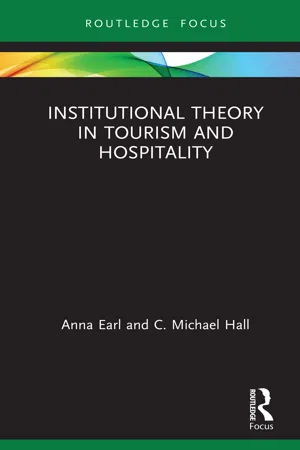
- 132 pages
- English
- ePUB (mobile friendly)
- Available on iOS & Android
Institutional Theory in Tourism and Hospitality
About This Book
Institutions are fundamental aspects for driving tourism and hospitality globally. They are the socio-economic "rules of the game" that serve to shape and constrain human and organisational interactions. This book is the first of its kind to provide a comprehensive overview of institutional theory in a tourism and hospitality context.
The complexity and multiple scaled nature of the institutional environment plays a crucial role in the development and formation of tourism destinations, attractions, organisations, and businesses, as well as influencing the activities of individuals. Institutional theory therefore provides a means to understand the complexity and processes of change at different scales of analysis and provides insights into the organisational and political basis of tourism policy development and implementation. Chapters introduce and expand on institutional analysis in tourism and hospitality, institutional theory in the social sciences, methodological issues, and future directions in institutional analysis in tourism and hospitality, making use of case studies throughout.
This book will appeal to students of tourism, hospitality, leisure, and events, as well as other social science disciplines. Providing a comprehensive overview of and guide to the application of institutional theory, this book will serve as a complete reference to institutional theory in a tourism and hospitality setting for years to come.
Frequently asked questions
Information
1 Institutional analysis and tourism
Introduction
Regulative | Social-Normative | Cultural-Cognitive | |
Basis of compliance | Expedience | Social obligation | Taken-for-grantedness, shared understanding |
Basis of order | Regulative rules | Obligations and expectations | Constitutive schema, social practices |
Mechanisms | Coercive – Formal and informal pressures such as government regulations and/or local culture | Normative – Arising from professionalisation, particularly of functional fields | Mimetic – Arising from uncertainty, organisations will imitate other organisations that appear successful or legitimate |
Logic | Instrumentality | Appropriateness | Orthodoxy |
indicators | Rules, laws, regulations, sanctions | Certification, accreditation, membership | Common beliefs, shared logics of action, isomorphism |
Basis of legitimacy | Legally sanctioned | Morally governed, self-regulation | Comprehensible, recognisable, culturally supported |
- They are service organisations that are primarily focused on customers from outside of the immediate environment of the destination. This means that they are highly susceptible to any restrictions on voluntary mobility – which is the nature of tourism.
- They tend to be highly networked organisations.
- Organisations that are internationally focused and which are located in destinations are, like many international businesses, susceptible to changes in the institutional environments of both tourist generating region and the destination country.
- The movement of people across borders is highly regulated at the national level.
- Tourism has not historically been given much significance as a policy area despite its economic significance. This makes it highly susceptible to changes in other policy fields and regimes.
- Travel may be susceptible to informal pressures arising from socio-political concerns regarding rights, justice, morality, religious mores, and the appropriateness of leisure behaviours.
Table of contents
- Cover
- Endorsements
- Half-Title
- Series
- Title
- Copyright
- Dedication
- Contents
- List of figures
- List of tables
- List of boxes and cases
- Preface and acknowledgements
- List of abbreviations
- 1 Institutional analysis and tourism: An introduction
- 2 Disciplinary foundations: Institutional theory in the social sciences
- 3 Institutional analysis
- 4 Conclusions: Methodological issues and future directions in institutional analysis in tourism and hospitality
- References
- Index